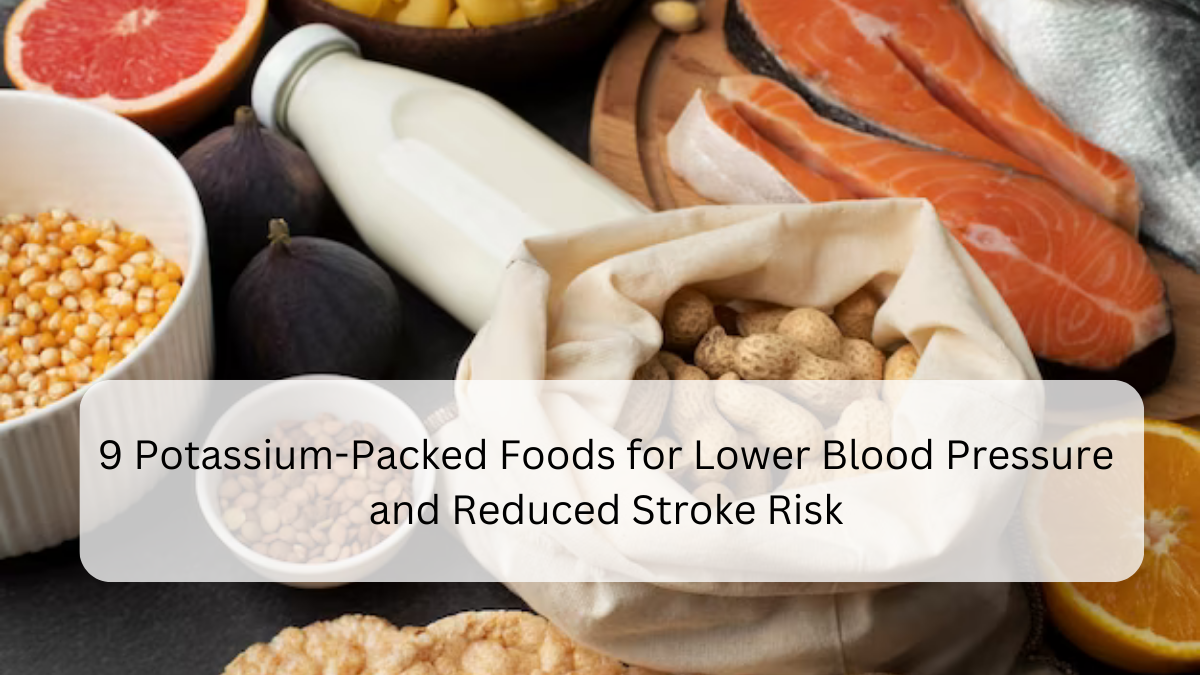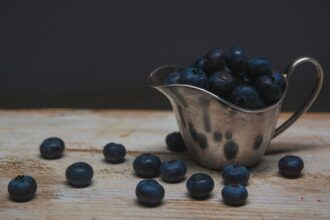Introduction:
Two major global health problems are the danger of stroke and high blood pressure. Dietary decisions have a major role in managing chronic disorders, and potassium is an important but sometimes disregarded dietary component. Numerous studies have demonstrated the amazing ability of meals high in potassium to control blood pressure and reduce the risk of stroke. Examining nine foods high in potassium reveals their important function in improving cardiovascular health, providing a possible path to proactive health.
Understanding the Role of Potassium:
Potassium is an essential mineral and electrolyte that is required for many body processes, including nerve signal transmission, muscle contraction regulation, and fluid balance. However, its significant impact on cardiovascular health is especially noticeable. Potassium supports vasodilation and lessens the pressure on blood vessels by acting as a counterbalance to sodium.
This process successfully reduces blood pressure, which reduces the risk of stroke by promoting a better vascular environment. Its function in reducing these cardiovascular risks emphasizes how important a sufficient potassium intake is for heart health and general wellbeing.
The Top Nine Potassium-Packed Foods:
1. Bananas: The high potassium content of bananas is well known, and they are a practical and adaptable way to get this vital mineral. About 400–500 mg of potassium is found in a medium-sized banana, making it a readily available food for anyone trying to increase their potassium consumption. Because of their inherent portability and adaptability, including bananas in one’s diet is an easy approach to support a nutritional plan high in potassium, which enhances general health and well-being.
2. Sweet Potatoes: Sweet potatoes are a great source of potassium because of their delicious flavor and high nutritional content; a medium-sized dish contains about 400–500 mg of potassium. In addition to having a high potassium level, these colorful tubers are a nutritional powerhouse that goes above and beyond taste thanks to their amazing range of antioxidants and fiber.
This special blend of potassium, fiber, and antioxidants supports cardiovascular health in many ways and is particularly beneficial to heart health. Sweet potatoes provide a great nutritional boost in addition to their delicious flavor, which makes them an excellent option for a heart-healthy diet.
3. Spinach: Among dark leafy greens, spinach is a verdant hero and a potassium powerhouse, packing a significant 800-900 milligrams of potassium per cooked cup. Among its leafy competitors, it stands out due to its potent potassium content. Enjoyed raw in salads, blended into nutritious smoothies, or added to a variety of prepared foods, spinach is a tasty and adaptable way to increase potassium consumption.
This superfood is a crucial component for promoting general health and vigor because it not only raises potassium levels in the diet but also provides a variety of vitamins, minerals, and antioxidants.
4. Avocados:In addition to its rich, creamy texture and healthful fat content, avocados are a potassium gold mine, with an astounding 700–800 mg of potassium per fruit. Avocados are a special source of this vital mineral, even beyond their culinary appeal. Enjoyed either sliced on sandwiches or as the center of rich guacamole, these adaptable fruits provide a tasty and inventive way to increase potassium intake.
Avocados are a delicious addition that improves general health and well-being and extends beyond flavor because to their potassium-rich content.
5. Beans and Lentils:Beyond their well-known protein and fiber levels, legumes—which include kidney beans, black beans, and lentils—also pack a potent nutritional punch with an average of 600–700 mg of potassium per cooked cup. More than just naturally high in protein and fiber, these legumes are very adaptable ingredients.
They can be used to boost potassium levels in the diet or added to colorful salads, robust main dishes, or cozy soups. Legumes’ nutritional profile is enhanced by their capacity to offer a significant potassium boost, making them a tasty and vital part of a healthy diet.
6. Oranges: Oranges are the standout fruit in the colorful world of citrus fruits, providing a surprising 200–300 mg of potassium per medium-sized fruit in addition to a vitamin C boost. Oranges have a rich nutritional profile that includes potassium, in addition to their spicy and pleasant flavor. Whether consumed whole, with all of its juicy goodness, or as a zesty, freshly squeezed drink, adding oranges to one’s diet appears to be a tasty and beneficial way to raise potassium levels.
Because of this combination of potassium and vitamin C, oranges become more than just a tasty citrus fruit and become a versatile part of a healthy and energizing diet.
7. Yogurt: Probiotic-loving yogurt has a little-known gem hidden inside its creamy texture: potassium, which can range from 200–400 milligrams per cup, depending on the kind. This lesser-known feature enhances the nutritional profile of yogurt and broadens its appeal beyond its probiotic advantages. Choosing low-fat or decadent Greek yogurt brings a potassium-rich option to the table in addition to being a delicious option for breakfast or snacks.
Yogurt’s twofold benefit of potassium enrichment and microbial support makes it a flexible and nutritious complement to regular meals that promotes general health and well-being.
8. Salmon:Salmon, well-known for its many health benefits, contains an unexpected nutrient: potassium, which is present in large amounts (500–600 mg/fillet). In addition to its well-known omega-3 fatty acids, salmon is surprisingly high in potassium, which enhances its nutritional worth. Including this tasty fish in meals provides a substantial potassium boost in addition to a heart-healthy dosage of omega-3 fatty acids.
Because of this special mix, salmon is an excellent option for heart health promotion, providing not only the necessary nutrients for general health but also a tasty complement to a well-balanced diet.
9. Tomatoes: Tomatoes, versatile and vibrant, harbor a lesser-known nutritional gem: potassium, delivering a substantial 300-400 mg per cup, whether fresh or in sauce form. Beyond their culinary versatility, tomatoes stand out as a surprising source of this essential mineral, elevating their nutritional profile. Harnessing tomatoes as a base for sauces or incorporating them into salads not only enhances flavor but also contributes significantly to potassium intake.
This dual benefit of flavor enhancement and potassium enrichment makes tomatoes a flavorful and nutritious addition to various dishes, offering a delightful way to boost potassium levels in the diet while enjoying their vibrant taste.
The Link Between Potassium and Cardiovascular Health:
Numerous studies emphasize the relationship between potassium intake and cardiovascular health. Adequate potassium levels are associated with lower blood pressure, reduced risk of stroke, and improved overall heart function. The DASH (Dietary Approaches to Stop Hypertension) diet, which emphasizes potassium-rich foods, has demonstrated significant effectiveness in managing hypertension.
Incorporating Potassium-Rich Foods into Daily Diet:
Integrating potassium-rich foods into one’s diet doesn’t have to be complicated. Simple strategies like creating balanced meals, incorporating a variety of fruits and vegetables, choosing whole grains, and mindful seasoning with herbs and spices can naturally boost potassium intake.
Conclusion:
The impact of potassium on blood pressure regulation and stroke risk reduction cannot be overstated. Including potassium-rich foods in daily meals not only aids in maintaining healthy blood pressure but also contributes to overall cardiovascular well-being. By embracing a diet abundant in potassium-packed foods like bananas, sweet potatoes, spinach, avocados, beans, lentils, oranges, yogurt, salmon, and tomatoes, individuals can take proactive steps toward better heart health and stroke prevention.
Final Thoughts:
Prioritizing a diet rich in potassium isn’t just a dietary choice; it’s a proactive step towards maintaining optimal cardiovascular health. By embracing these potassium-packed foods, individuals can take control of their well-being, mitigating risks and promoting a healthier, more balanced lifestyle.






